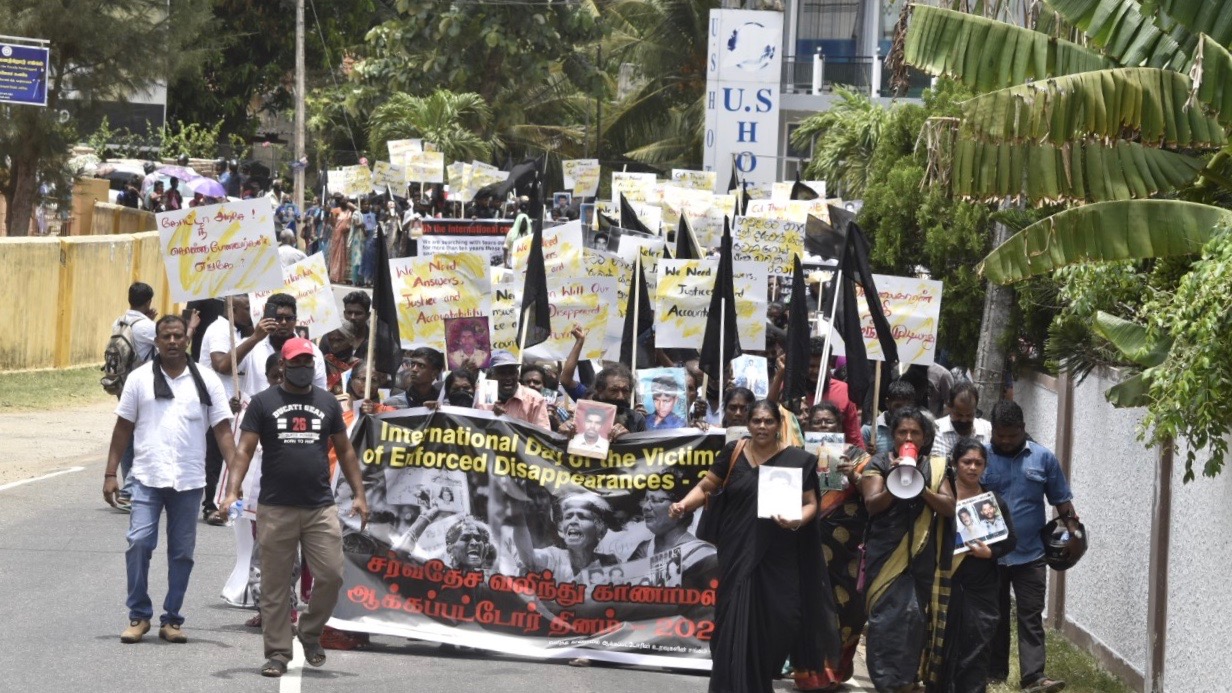On August 30, Sunday, on the International Day of the Victims of Enforced Disappearances, hundreds of families of disappeared persons in Sri Lanka carried out protest rallies in the northern and north-eastern districts. The protesters sought justice for the thousands of ethnic minority Tamils who went missing during the latter part of the civil war in Sri Lanka, which ended in May 2009.
“Relatives of the forcibly disappeared have been protesting on the streets across the North East for 1,289 days, demanding to know the whereabouts of their loved ones,” Tamil Guardian reported.
Protesters in Jaffna and Batticaloa were seen holding placards and banners rejecting the country’s Office for Missing Persons and calling for an international impartial inquiry to find those who have disappeared. The families also demanded the abolishing of the prevention of terrorism act. Calling for international justice, many asked for an international investigation to be conducted through the International Criminal Court.
Among the main demands addressed to the ruling dispensation was for the release of valid information on the current status of detained political prisoners, and on those who were kidnapped and kept in refugee camps before and after the war began in the country.
#Protests held in #Jaffna yesterday marking the #International Day of the Victims of Enforced Disappearances.#SriLanka #Lka #tamil #COVID19 #ltte #CivilWar pic.twitter.com/YirZ8m9jf2
— Buvini Liyanagamage (@BuviniL) August 31, 2020
As per the estimates of the People for Equality and Relief in Lanka, between 60,000 to 100,000 people have been subjected to enforced disappearances in the country ever since the start of the armed ethnic conflict between the Sinhalese and Tamils.
The protests assume additional significance as the recent parliamentary elections saw the return of former president Mahinda Rajapaksa to the position of prime minister. His brother Gotabaya Rajapaksa is the president. At the time when a majority of these atrocities took place, Mahinda was president and Gotabaya was defense secretary.
Various international bodies as well as the Sri Lanka-based International Trust and Justice Project have confirmed the persecution faced by Tamils activists at the hands of security forces for highlighting the plight of missing persons and their families. International Trust and Justice Project, in a statement on August 30, alleged the use of “Abduction, torture and rape as tactic to suppress them for digging the truth related the disappearances in Sri Lanka.”
Allegations of “whipping, blows to sexual organs, using cigarette burns, branding with a heated metal rod, water torture, asphyxiation, suspension in stress positions, mock executions and death threats, as well as rape, including gang rape” have been raised.
Even noted lawyers like Achala Senevirathne and Kumaravadivel Guruparan have complained of “facing life threats” for representing cases of families of the disappeared persons.
Earlier this January, Sri Lankan authorities came on record for the first time and accepted the fate of thousands of Tamils, acknowledging that at least 10,000 missing persons were actually “dead”. Nevertheless, the government continued to blame the Liberation Tigers of Tamil Eelam militant outfit for allegedly carrying out mass killings.
However, global rights bodies such as Amnesty International, Human Rights Watch, and the UN have accused the Sri Lankan security forces of violating human rights norms by indulging in widespread violence, enforced disappearances and the use of torture.
As per the UN and other international organizations, tens of thousands of Tamils were killed and many Tamil women were sexually assaulted and raped by the security forces in the final six months of the war.
Even though the war ended over a decade ago, the minority Tamils still wait for justice for the mass atrocities committed by the Sri Lankan government forces.
“For too long, the plight of the families of the disappeared has been used as a talking point and a prop for politicians and the international community, but no concrete measures have been taken,” said People for Equality and Relief in Lanka.
Last August, a large number of graves were discovered in Sri Lanka’s Mannar area. It was reported that around 300 people were dumped in the grave and up to 23 of them could be children below the age of 12. The discovery of mass graves has reinforced the demands for justice in the country.





